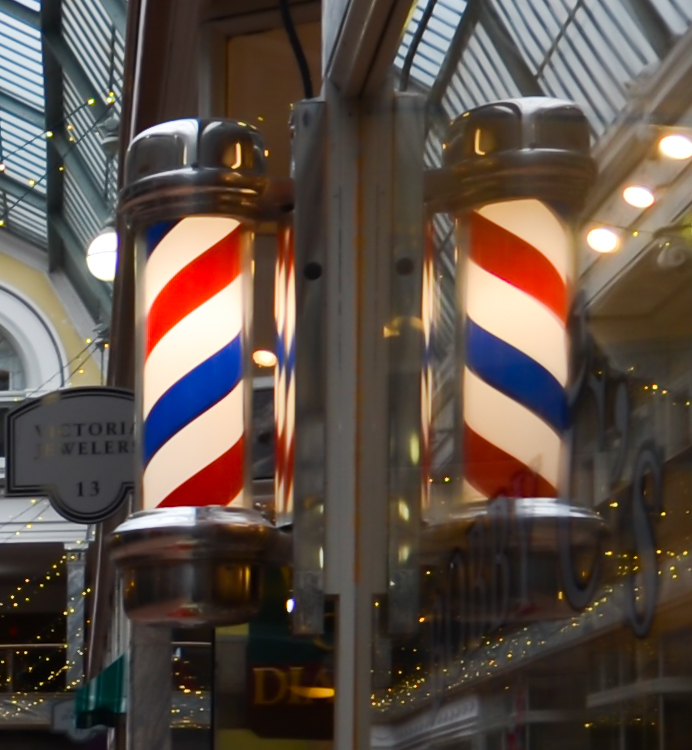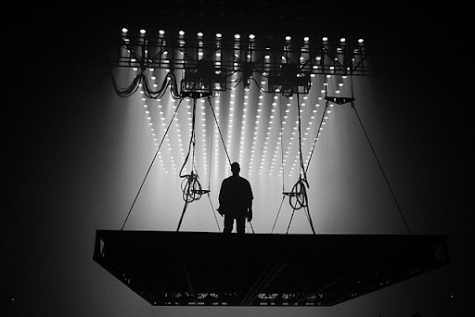Barbershops and Black Philosophy
Erik Dorst via Wikimedia commons
An American barber pole. In Europe, the poles are just red and white, while in America they include blue, for unclear historical reasons.
I remember going in to get my haircut and being asked to weigh in on a philosophical discussion. These conversations were not uncommon, and on that day, the guys in the shop were talking about meditation and treating it as semi-ancestral knowledge that The Man (whomever that was) didn’t want us to know.
Weary of incurring my barber’s wrath and leaving with a crooked cut, I offered a dull statement of agreement. I threw in some references to the Greek philosophy I had been reading, and that was a wrap.
The entire discussion stuck with me. These were regular, everyday black folk going about their business, discussing philosophy, the nature of existence, and how to live a good life. What struck me was that the ideas they were using weren’t from the lengthy black intellectual tradition.
There was a desire in this conversation. An intense desire for ideas that could provide an efficient way to make sense of the world we inhabited as black Americans. As a people whose history is defined by our detachment from our home cultures and forced relocation and whose material conditions have consistently bounced between varieties of bad and worse for the majority of our history on this continent, ideas and frameworks that can make sense of the world around us can be immensely useful.
Throughout black history, there has never been a lack of black thinkers to attend to this desire. I could spend an entire 500-word column rattling off names and ideas from black public intellectuals. While I heard no one called out by name over the sound of the clippers, I could hear the influences. They were less DuBois and Michael Eric Dyson and more Dr. Umar and Dr. Sebi.
The discussion wasn’t bad, per se. The takeaways were solid. But the logical steps taken to reach those takeaways were somewhat flawed. The philosophical appetite of modern black America, while voracious, is increasingly satisfied by barely nutritional filler. Sure, it may give you energy in the short term, a push to take matters into your own hands or think critically about the world around you, but there’s no deeper sustenance.
This lack of solid philosophy creates a void of reason. There’s a lack of satisfactory explanations for why things are the way they are, a lack of a compelling understanding of the conflicts black people face both internally and externally. Black filler philosophy serves to fill the void of reason in the same way that Coke is hydrating. It may feel thirst-quenching, but it leaves you dehydrated.
In “Race Matters,” Cornell West discusses a threat to black America. He calls it the nihilistic threat, but not in the traditional philosophical sense. His nihilism is a deep and pervasive sense of hopelessness, one that’s been with us forever.
West’s nihilistic threat has been with black people since our first violent encounters with colonialism. To protect ourselves against this nihilism, West said, our forefathers and foremothers created buffers that “consisted of cultural structures of meaning and feeling that created and sustained communities.”
At the time of his writing, these buffers had been thoroughly eroded. Black America was in a state of disrepair and disarray. However, now we can see black America attempting to rebuild these barriers, although the bricks we use are fragile.
In that conversation in the barbershop, there was an attempt to find that meaning. There was an earnest attempt to fill that void of reasons. What filled that void was almost pseudoscientific filler philosophy, but that was all that was on hand.
We all want to fill the void of reasons. We all want explanations for why black America seems to be struggling. But until we rediscover our vast and deep intellectual tradition, black America will be forever doomed to fill the void with lackluster materials.
Doing this will require effort. It will require a serious push to analyze the void, how and why we try to fill it, what we are currently filling it with, and why we use what we use to do so.
The guys in the barbershop were proof that there is a desire to rebuild those structures of meaning, as West put it. The only issue was that they lacked good bricks.







